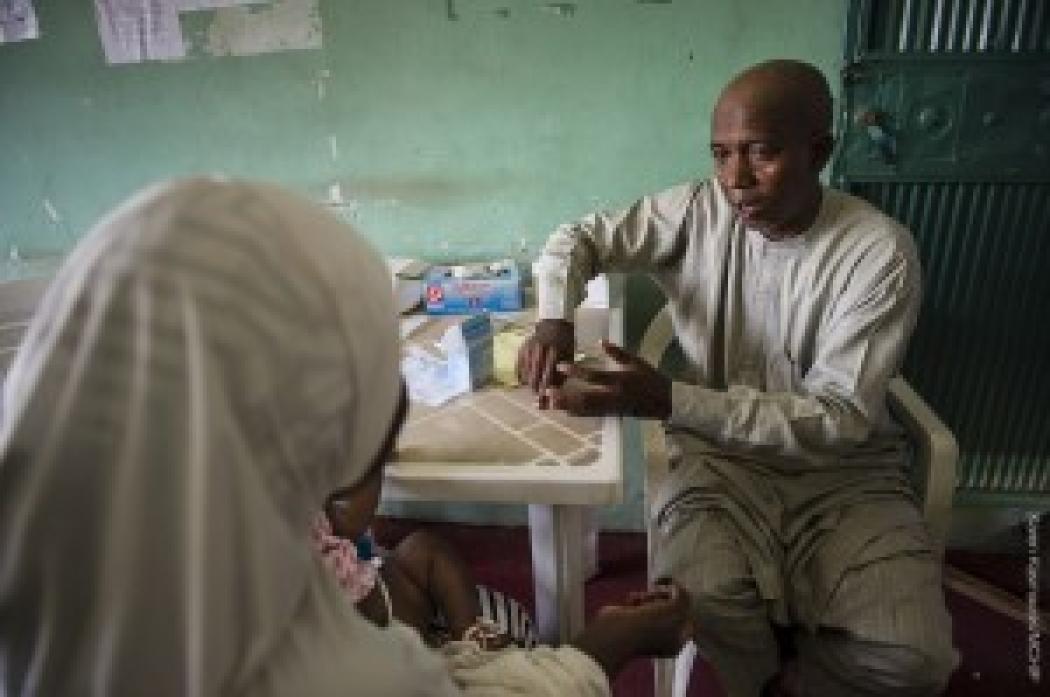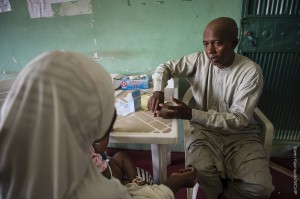Health Workers Step Up to Save Lives

By Kait Atkins, Jhpiego
This week, thousands of health workers, researchers and advocates gather in Melbourne, Australia, for the 20th International AIDS Conference. Tragically, we lost several of these dedicated professionals aboard Malaysian Airlines Flight 17. Their loss is felt and mourned deeply among all those fighting AIDS, and further inspires our commitment toward the conference’s theme: “stepping up the pace” to change the course of the epidemic.
As we at Jhpiego think about stepping up the pace of the fight against HIV and AIDS, we know that frontline health workers play a critical role—armies of tireless, committed men and women serving to step up the pace in global HIV prevention, treatment and care services. Health workers are integral to our mission of improving the health of women and their families.
“The leading cause of death for women of reproductive age worldwide is HIV and AIDS, and in sub-Saharan Africa, 60 percent of people living with the disease are women,” says Jhpiego’s President and CEO Leslie Mancuso. Jhpiego has had the great privilege of working alongside countless frontline health workers in the fight against HIV and AIDS. They inspire us with their leadership and compassion, and the unique ways that they impact the communities in which they work.
Here are just a few examples of why we believe increasing investment and support for frontline health workers is vital to ushering in an AIDS-free generation.
Midwives Bring Hope
In Ethiopia, midwife Yesuf Adem is bringing hope to HIV-positive mothers in their communities. Adem’s work in Leguama Health Center has allowed him to help mothers like Yeworkwuha, who learned early in her sixth pregnancy that she was HIV-positive. Adem was trained in the prevention of mother-to-child transmission of HIV (PMTCT) by the Jhpiego-led Maternal and Child Health Integrated Program (MCHIP), a project supported by USAID. He carefully counseled Yeworkwuha on the prospects of living positively with her diagnosis, explaining to her the high chance of having an HIV-free baby with proper medication and even how to breastfeed properly.
Now, after having given birth to a baby boy, Yeworkwuha says that “without [Adem’s] support, I could have been severely ill or could have even ended up dead. Instead, I was given the chance to see my children grow.”
Community Health Workers Go Door to Door
In Mozambique, through funding by the Centers for Disease Control and Prevention (CDC), Leta Ernesto Majonise is one of a team of community health counselors who go door to door. They test residents for HIV, check for symptoms of tuberculosis (TB), provide wellness information and connect people with services through Jhpiego’s integrated HIV and TB community counseling and testing approach. Majonise joined the ranks of Mozambique’s community health counselors because she knows many people in her community suffer from preventable diseases. She has counseled and tested nearly 600 people and referred 70, including patients who are HIV-positive or suspected to have TB, for services.
“I enjoy my work,” Majonise says, “because I am convinced that this program is helping people change their minds [about accessing health services] and their lives.”
Nurses Break Stereotypes
In Tanzania’s efforts to prevent the spread of HIV, Illuminata Sanga is breaking ground and stereotypes. She is among the 200 nurses who are performing voluntary medical male circumcisions (VMMCs) proficiently and safely in an area of Tanzania that has been hit especially hard by the HIV/AIDS epidemic. Sanga received her training in VMMC as part of the Jhpiego-supported MCHIP program, supported by the President’s Emergency Plan for AIDS Relief (PEPFAR) through USAID.
“Over 60 percent of the providers in Iringa are nurses, taking the lead in all steps of the VMMC procedure. This is a strong example of task shifting, a key component of efficiency principles recommended by WHO [the World Health Organization] in scaling up VMMC services in the target countries,” says Augustino Hellar, VMMC Program Advisor at Jhpiego’s Tanzania office.
The stories and achievements of these men and women provide only a glimpse of the incredible efforts of frontline health workers responding to the HIV epidemic in sub-Saharan Africa.
As this response continues to evolve—with new strategies such as the use of microbicides for HIV prevention and pre-exposure prophylaxis for the most at-risk populations—it is imperative to ensure that frontline health workers continue to receive the skills and support they need to bring care to their communities, and to increase equitable access to health workers to ensure that all those who are in need of HIV treatment and care receive it.
With frontline health workers’ continued contributions, we are truly stepping up the pace in the global fight against HIV.

